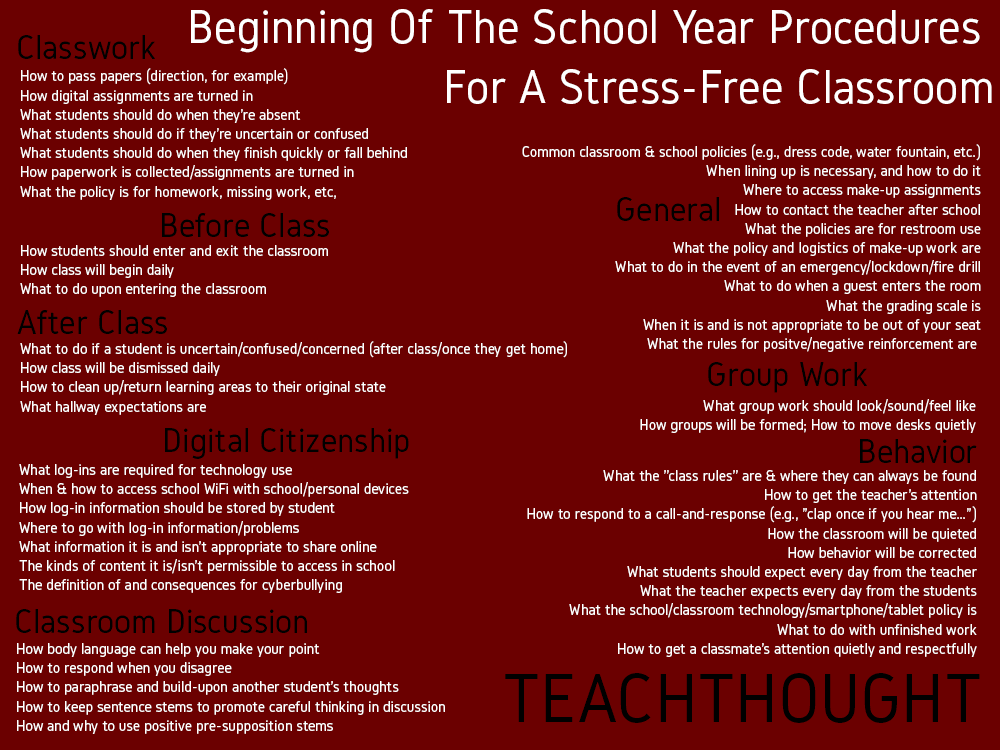
50 Beginning Of The School Year Procedures For A Stress-Free Classroom
by TeachThought Staff
Procedures can make a significant difference in the learning of your students. Organization can lead to student engagement, and student engagement can lead to, of course, learning.
Note that this post is all about classroom procedures–not your typical TeachThought fare, but considering you’re most likely a teacher or work directly with teachers, it could make your life a bit easier. So here we go–pretty self-explanatory: 50 Beginning Of The School Year Procedures For A Stress-Free Classroom. (Note that we’re going to add to the list, so it will eventually be more than 50.)
50 Beginning Of The School Year Procedures For A Stress-Free Classroom
General Classroom Procedures
What supplies are expected daily
When lining up is necessary, and how to do it
Where to access make-up assignments
How to contact the teacher after school
What the policies are for restroom use
What the policy and logistics of make-up work are
Classroom and school policies for dress code, water fountain, prescribed medication, pencil sharpening, and gum, food and drink
What to do in the event of an emergency/lockdown/fire drill
What to do when a guest enters the room (speaker, administrators for walk-throughs, other students, etc.)
What the grading scale is
What to do when work is completed early
What the policy is for pencils/pens
When it is and is not appropriate to be out of your seat
What the rules are for positive/negative reinforcement (i.e., this happens for following/not following rules)
Digital Citizenship
What digital citizenship is and why it matters
What log-ins are required for technology use
When and how to access school WiFi with school/personal devices
How log-in information should be stored by student
Where to go with log-in information/problems
What information is and isn’t appropriate to share online
What the school policy is on content access online
The definition of and consequences for cyberbullying
What kinds of content it is and isn’t appropriate to access at school
Before Class
How students should enter and exit the classroom
How class will begin daily
What to do upon entering the classroom
Classroom Behavior
What the class norms or ‘class rules‘ are
How to ask a question
How to get the teacher’s attention
How to respond to a call-and-response (e.g., “clap once if you hear me…”)
How the classroom will be ‘quieted’ if too loud
How students will be corrected for behavior that doesn’t align with class norms
What students should expect every day from the teacher
What the teacher can expect every day from the students
What the school/classroom technology/smartphone/tablet policy is
What to do with unfinished work (also if there is any specific policy like a ‘no zero’ policy)
Classwork
How to pass papers (direction, for example)
How digital assignments are turned in
What students should do when they’re absent
What students should do if they’re uncertain or confused
What students should do when they fall behind on an assignment or a project at home, etc.
How paperwork is collected/assignments are turned in
What the policy is for homework, missing work, extra-credit and other related classroom activities is
Group Work
What group work should look/sound/feel like
How to use positive pre-supposition stems and question stems for more organized and critical thinking
How to move desks quietly
How to get a classmate’s attention quietly and respectfully
Classroom Discussion
How to get to your/make your point clear
How body language can help you communicate
How groups will be assigned/formed
How to respond when you disagree
How to paraphrase and build-upon another student’s thoughts
How to keep sentence stems to promote careful thinking in discussion
After Class
What to do if a student is uncertain/confused/concerned directly after class/once they get home
How class will be dismissed daily
How to clean up/return learning areas to their original state
What hallway expectations are

